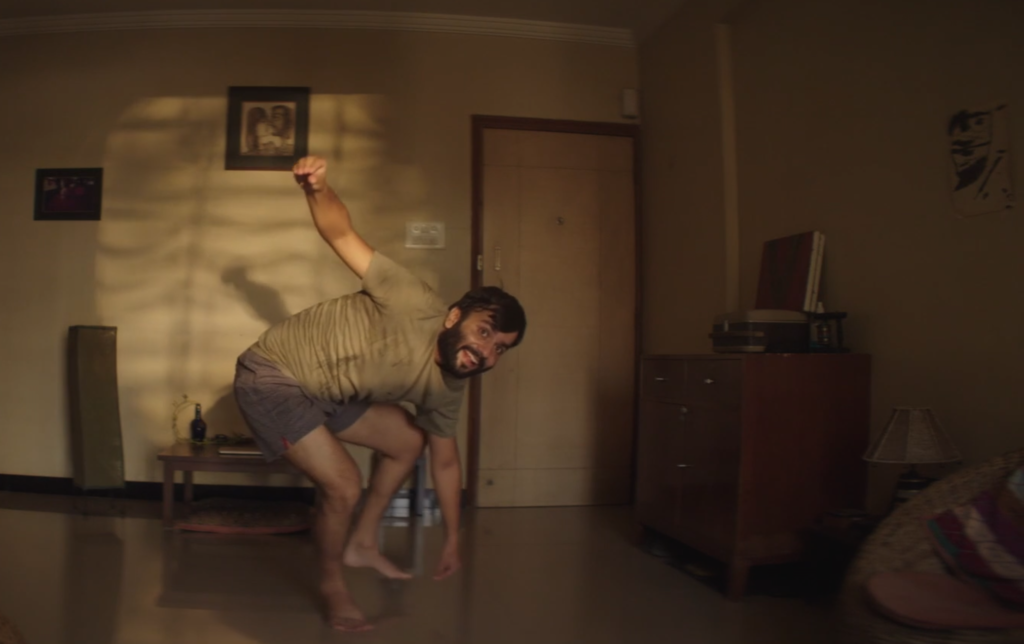Abhijit Mazumdar’s Body looks at the psychological effects of reckless actions driven by drunken revelry and how they can significantly impact a person’s life. Set against the bustling backdrop of Mumbai, this gripping indie film handles its delicate subject matter with remarkable precision, never feeling overly exploitative while challenging warped social values that dismiss individual emotions.
Body sees Manoj (Manoj Sharma), a young and struggling theater actor, joining his peers at a retreat in a village near Mumbai. During an early morning swim, he is bullied by his drunken friends, who abandon him in an isolated location and force him to navigate his way back alone without a shred of clothing. Back in Mumbai, Manoj’s trauma persists, leading to his public breakdown, where he is seen wandering the streets naked. His partner, Khushboo (Khushboo Upadhyay), tries to help him but cannot halt his descent into despair. Missing rehearsals and losing his grip on reality, Manoj befriends a boy from a neighboring apartment only to discover all is not well at that end either…
Mazumdar opens the film over a black screen with credits, accompanied by a segment from Anthony Neilson’s play Normal, based on the serial killer Peter Kurten from Germany. The play delves into topics of evil, sanity, madness, and the nature of normalcy, immediately drawing parallels with Manoj’s own personal issues. Mazumdar maintains a sobering and grim tone throughout the narrative, portraying the protagonist as a shell-shocked vagabond navigating the chaos of the metropolis. With remarkable sensitivity, he skillfully captures the shifting dynamics of human relationships in contemporary society.
While the film may seem blunt in its approach, it is, in fact, a deeply layered exploration of a society in crisis. Fragmented and unravelling, as Manoj begins to lose his grip on reality, his friends refuse to take responsibility for the misfortune that has befallen him. It shatters Manoj’s immediate reality and leaves deep and enduring scars. In this state of alienation and despair, with mounting prejudice all around him, Manoj finds solace in bonding with a young boy from his neighbourhood. However, he soon finds out that the boy and his mother are victims of domestic violence, reinforcing the film’s recurring theme of vulnerability and systemic neglect. This chain of trauma and its ripple effects remains a constant in the narrative. Manoj’s gym trainer, Sandeep (Sandeep Dhabale), becomes a new source of companionship, offering him a brief reprieve. But his escape to a camping trip with Sandeep only leads to further complications as the journey unearths new layers of his fractured psyche and the collective indifference of the society around him. Through these interconnected threads, the film skillfully depicts the fragile, often harrowing, realities of human relationships.
The film offers no easy answers. Whether Manoj will ever be able to lead a normal life remains an open question, reflecting the film’s deeper interest in exploring the lingering impact of trauma. This ambiguity is one of several directorial choices in a story that concludes with a beautifully understated emotional release caught between the possibility of healing and the weight of the past.
Wounded and stoic, Manoj Sharma masterfully underplays Manoj’s inner turmoil, quietly drifting through scenes while always remaining on edge. He embodies the role with a silent intensity, ensuring that his vulnerability never veers into titillation. It is a brave and demanding role, and Sharma rises to the challenge with remarkable conviction. Khushboo Upadhyay, as Manoj’s partner Khushboo, effortlessly portrays the complexities of a supportive yet conflicted partner. Sandeep Dhabale, as Sandeep, brings a layered performance, imbuing his character with understated depth. The supporting cast, including Amol Deshmukh and Jatin Negi, further enriches the film with their strong and convincing performances.
The cinematography by Vikas Urs features long, uninterrupted takes that allow us to immerse in the scenes and experience the emotions unfolding while ensuring that every shot contributes significantly to the storytelling. Krishnendu Sarkar’s editing lends the film a languid pace, thereby enhancing its reflective and meditative tone. The sound design by Amala Popuri creates a serene soundscape in perfect harmony with the film’s milieu.
Body is being screened as part in the International Competition section of the current edition of the International Film Festival of Kerala (IFFK), being held from the 13th to the 20th of December, 2024.
Hindi, Drama, Color


